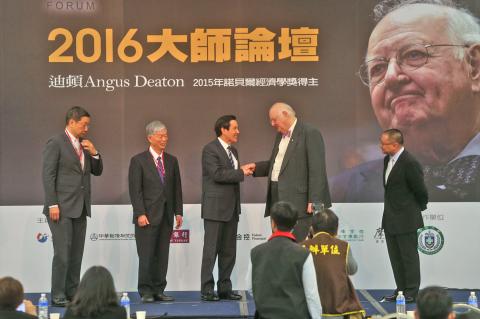Nobel laureate Angus Deaton yesterday lent support to basic income grants as part of government efforts to mitigate wealth and consumption inequality.
“The government should take care of people with low income and should be pushing basic income grants,” the economist told a forum at the Taipei International Convention Center.
Basic income grants, or guaranteed income, are a government-ensured guarantee that no citizen’s income falls below the level necessary to meet their most basic needs.

Photo: CNA
Advocates say the program is an efficient, effective and equitable solution to poverty that not only promotes individual freedom, but also keeps the beneficial aspects of a market economy in place.
Deaton, a professor of economics and international affairs at Princeton University, said that risk, even stationary risk, cumulates into inequality when shaped by rapid technical progress, globalization and a rapidly changing world.
“The larger the factor of shocks, the riskier the world becomes, the more potential there is for increases in inequality,” he said.
Deaton was awarded the Nobel Prize in Economics last year for his analysis of consumption, poverty and welfare, with the Economic Sciences Prize Committee saying that his work linking individual choices and aggregate outcomes had helped transform the study of microeconomics, macroeconomics and development economics.
Deaton last year said that there are still 700 million poor people in the world and they are “a constant reproach to all of us.”
Wealth inequality is likely to increase at a much faster pace unless there is some offset from an insurance arrangement under a range of personal and social mechanism that ties people together, Deaton has said.
Deaton has said that climate change and inequality are the two greatest challenges facing the world, adding: “I do worry about a world in which the rich get to write the rules.”
Deaton has also taken a keen interest in Taiwan, calling it “the home of saving” because people at all ages save a lot, just as all ages save little in the US.
He said he is not able to account for the phenomenon after examining housing, bequest and small business ownership needs.
Deaton rejected the link between Taiwan’s excessive savings and Confucianism, adding that South Koreans are also influenced by Confucius, but save less.

SELL-OFF: Investors expect tariff-driven volatility as the local boarse reopens today, while analysts say government support and solid fundamentals would steady sentiment Local investors are bracing for a sharp market downturn today as the nation’s financial markets resume trading following a two-day closure for national holidays before the weekend, with sentiment rattled by US President Donald Trump’s sweeping tariff announcement. Trump’s unveiling of new “reciprocal tariffs” on Wednesday triggered a sell-off in global markets, with the FTSE Taiwan Index Futures — a benchmark for Taiwanese equities traded in Singapore — tumbling 9.2 percent over the past two sessions. Meanwhile, the American depositary receipts (ADRs) of Taiwan Semiconductor Manufacturing Co (TSMC, 台積電), the most heavily weighted stock on the TAIEX, plunged 13.8 percent in

A wave of stop-loss selling and panic selling hit Taiwan's stock market at its opening today, with the weighted index plunging 2,086 points — a drop of more than 9.7 percent — marking the largest intraday point and percentage loss on record. The index bottomed out at 19,212.02, while futures were locked limit-down, with more than 1,000 stocks hitting their daily drop limit. Three heavyweight stocks — Taiwan Semiconductor Manufacturing Co (TSMC, 台積電), Hon Hai Precision Industry Co (Foxconn, 鴻海精密) and MediaTek (聯發科) — hit their limit-down prices as soon as the market opened, falling to NT$848 (US$25.54), NT$138.5 and NT$1,295 respectively. TSMC's

ASML Holding NV, the sole producer of the most advanced machines used in semiconductor manufacturing, said geopolitical tensions are harming innovation a day after US President Donald Trump levied massive tariffs that promise to disrupt trade flows across the entire world. “Our industry has been built basically on the ability of people to work together, to innovate together,” ASML chief executive officer Christophe Fouquet said in a recorded message at a Thursday industry event in the Netherlands. Export controls and increasing geopolitical tensions challenge that collaboration, he said, without specifically addressing the new US tariffs. Tech executives in the EU, which is

In a small town in Paraguay, a showdown is brewing between traditional producers of yerba mate, a bitter herbal tea popular across South America, and miners of a shinier treasure: gold. A rush for the precious metal is pitting mate growers and indigenous groups against the expanding operations of small-scale miners who, until recently, were their neighbors, not nemeses. “They [the miners] have destroyed everything... The canals, springs, swamps,” said Vidal Britez, president of the Yerba Mate Producers’ Association of the town of Paso Yobai, about 210km east of capital Asuncion. “You can see the pollution from the dead fish.